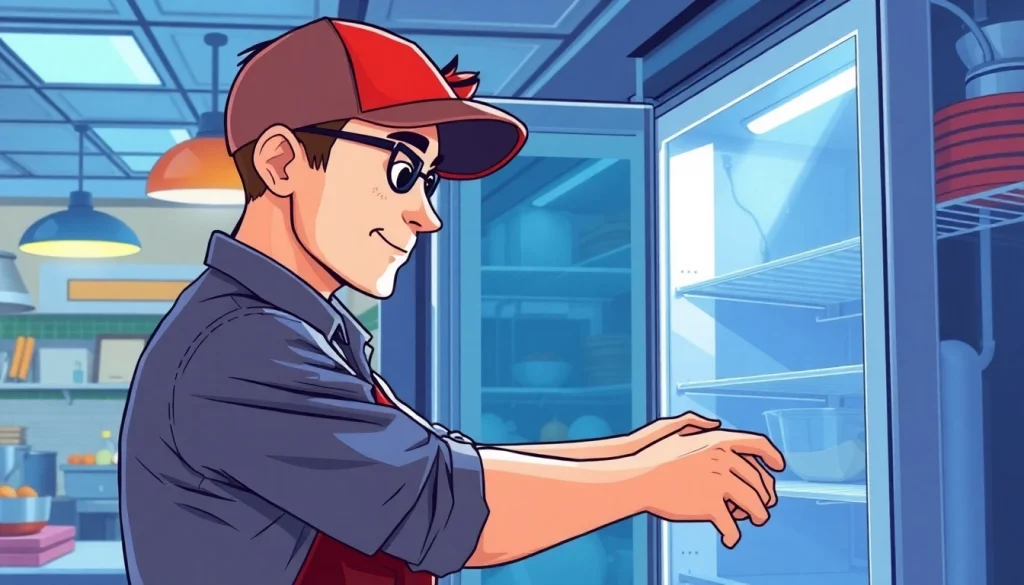Understanding Commercial Refrigerator Repair Needs
For businesses that depend on commercial refrigerators, understanding the need for repair is essential for operational efficiency. Issues that arise with refrigeration units can lead to product loss, downtime, and significant financial implications. Recognizing these needs starts with identifying common issues that these machines face, understanding preventative maintenance strategies, and knowing when to contact a professional for repairs. This article delves into the intricacies of commercial refrigerator repair, offering insights to keep your equipment running smoothly.
Identifying Common Issues
One of the key aspects of effective commercial refrigerator maintenance is being able to identify common issues early. These may include:
- Insufficient Cooling: When the refrigerator fails to maintain the desired temperature, it can be due to a variety of issues including blocked vents, dirty condenser coils, or malfunctioning thermostats.
- Unusual Noises: A compressor making strange noises could signal an impending failure. Regular checks for any unusual sounds can prevent future complications.
- Leaking Water: Water pooling around the base may indicate a clogged drain line or defrost drain, which requires immediate attention to prevent further damage.
- Frost Build-up: This is often due to a faulty door gasket allowing warm air to enter, which can lead to excessive ice formation.
Preventative Maintenance Strategies
Preventative maintenance is crucial in extending the lifespan of commercial refrigerators. Implementing regular maintenance schedules can save money in the long run and improve efficiency. Strategies include:
- Regular Cleaning: Scheduled cleaning of interior components, coils, and fans can prevent clogs and maintain efficiency.
- Temperature Checks: Consistently monitoring temperatures ensures they remain at safe levels for product storage.
- Daily Operational Inspections: Checking for leaks, unusual noises, or humidity levels can identify potential issues before they escalate.
- Professional Maintenance Contracts: Engaging professionals for routine check-ups can ensure thorough inspections and repairs as needed.
When to Call a Professional
While some minor issues can be fixed in-house, it’s crucial to recognize when to call a professional. Common signs include:
- Persistent cooling issues despite cleaning and checks.
- Electrical problems such as frequent tripping of circuit breakers.
- Complex refrigerant leaks that require specialized equipment to repair.
- Overall performance decline impacting business operations.
Key Components of Commercial Refrigerators
Refrigeration Systems Overview
Understanding the components that make up commercial refrigeration systems is vital for diagnosing issues accurately.
Common systems include:
- Compressor: Acts as the heart of the refrigeration system, compressing refrigerant and circulating it throughout the unit.
- Condenser Coil: This is where heat is released outside the unit, allowing the refrigerant to cool and turn back into a liquid.
- Evaporator Coil: Inside the refrigerator, this coil absorbs heat from the interior, keeping the environment cold.
- Expansion Valve: Controls the flow of refrigerant into the evaporator, maintaining system pressure.
Importance of Coils and Compressors
Among the components, compressors and coils play crucial roles in maintaining the effectiveness of commercial refrigeration systems. Any failure in these parts can lead to significant issues:
- Coil Maintenance: Dirty coils reduce efficiency and can lead to compressor failure. Regular cleaning is essential.
- Compressor Health: Symptoms like overheating or odd sounds can indicate looming compressor failure. Regular checks can mitigate these risks.
Electrical Systems and Repairs
The electrical systems in commercial refrigerators control everything from cooling cycles to temperature settings. Issues in this area can be tricky and may include:
- Faulty Thermostats: Inaccurate temperatures may result from malfunctioning thermostats, necessitating replacement or recalibration.
- Wiring Issues: Damaged or frayed wires can cause power failures, leading to improper cooling.
- Electrical Connections: Loose connections can disrupt operations, making regular checks important.
Choosing the Right Repair Service
Finding a reliable commercial refrigerator repair service can be daunting. However, there are several factors to consider that can simplify this choice.
Factors to Consider When Hiring
When selecting a repair service, consider the following factors:
- Experience and Specialization: Ensure the technician is experienced and specializes in commercial refrigeration systems.
- Licensing and Insurance: Verify that the service provider is properly licensed and insured.
- Response Time: A business can’t afford downtime; look for services that offer fast response times and emergency options.
Evaluating Service Offers
It’s essential to evaluate service offers carefully. Here’s what to look for:
- Transparent Pricing: A legitimate service will provide detailed and transparent pricing, free from hidden fees.
- Warranty on Repairs: Ensure that any repair work comes with a warranty or guarantee, showcasing the service’s confidence in their work.
- Additional Services: Look for companies offering maintenance as well as repair; this can save time and money in the long term.
Reading Customer Reviews and Testimonials
Before selecting a service, take the time to read customer reviews and testimonials. These can provide insight into others’ experiences and highlight important aspects such as:
- Quality of Work: Reviews can give you an idea of the reliability and thoroughness of the repairs conducted.
- Customer Service: A company’s ability to provide good customer service often translates to better support.
- Follow-Up Services: Look for reviews mentioning how the service deals with post-repair questions or concerns.
Cost Factors in Commercial Refrigerator Repair
Understanding the costs associated with commercial refrigerator repair is crucial for budgeting and expenditure control.
Average Repair Costs Explained
The average cost to repair a commercial refrigerator can range significantly based on several factors, typically falling between $300 and $1000, depending on the nature of the problem. Key cost factors include:
- Type of Repair: Simple fixes like thermostat replacements generally cost less than significant mechanical repairs.
- Brand and Model: Costs can vary based on the specific make and model of the refrigerator due to parts availability.
- Labor Costs: Technician rates may vary by location and service provider.
Hidden Costs to Watch Out For
When obtaining repair quotes, there may be hidden costs that can impact the overall expense. Be on the lookout for:
- Diagnostic Fees: Some services charge for diagnostics that may not be disclosed initially.
- Service Call Fees: Confirm whether a service fee is included, especially for emergency calls.
- Parts Markup: Understand the markup on replacement parts, as some services may substantially increase these costs.
Cost-effective Maintenance Solutions
Investing in preventative maintenance is often more cost-effective than reactive repairs. Consider the following strategies:
- Regular Professional Maintenance: Engaging a professional service for routine maintenance can prevent costly repairs.
- Safeguarding Product Quality: Regular temperature checks and cleanliness can save on product loss.
- Employee Training: Training staff on proper usage can significantly reduce wear and tear on the unit over time.
Future Trends in Commercial Refrigeration
As technology and environmental standards evolve, so do the innovations in commercial refrigeration. Keeping abreast of these trends can prepare businesses for the future.
Energy-efficient Refrigeration Innovations
Energy-efficiency is becoming increasingly important as businesses look to reduce operational costs and their carbon footprints. Innovations include:
- High-efficiency Compressors: New compressor technologies are designed to use less energy without sacrificing performance.
- LED Lighting: Utilizing LED systems in refrigerators can produce less heat and consume less electricity.
- Smart Thermostats: These systems can learn usage patterns and adjust cooling accordingly, ensuring optimal performance while saving energy.
The Role of Smart Technology
Smart technology is finding its way into commercial refrigeration, enhancing monitoring and maintenance.
- Remote Monitoring: Many modern systems allow for remote temperature monitoring, which can alert you to issues instantly.
- Internet of Things (IoT) Integration: IoT capabilities enable devices to communicate, streamlining maintenance scheduling and data analysis.
- Predictive Analytics: Analyzing operational data can forecast potential issues before they occur, allowing for timely repairs.
Building Sustainability in Refrigeration
With a growing emphasis on sustainability in all business practices, refrigeration is no exception. Strategies for sustainable practices include:
- Eco-friendly Coolants: Using refrigerants that have low global warming potential can reduce environmental impact.
- Regular Maintenance for Efficiency: Ensuring systems operate at peak efficiency can significantly reduce energy consumption.
- Upgrading Old Refrigeration Units: Investing in state-of-the-art systems that consume less power can lead to substantial savings in the long term.


